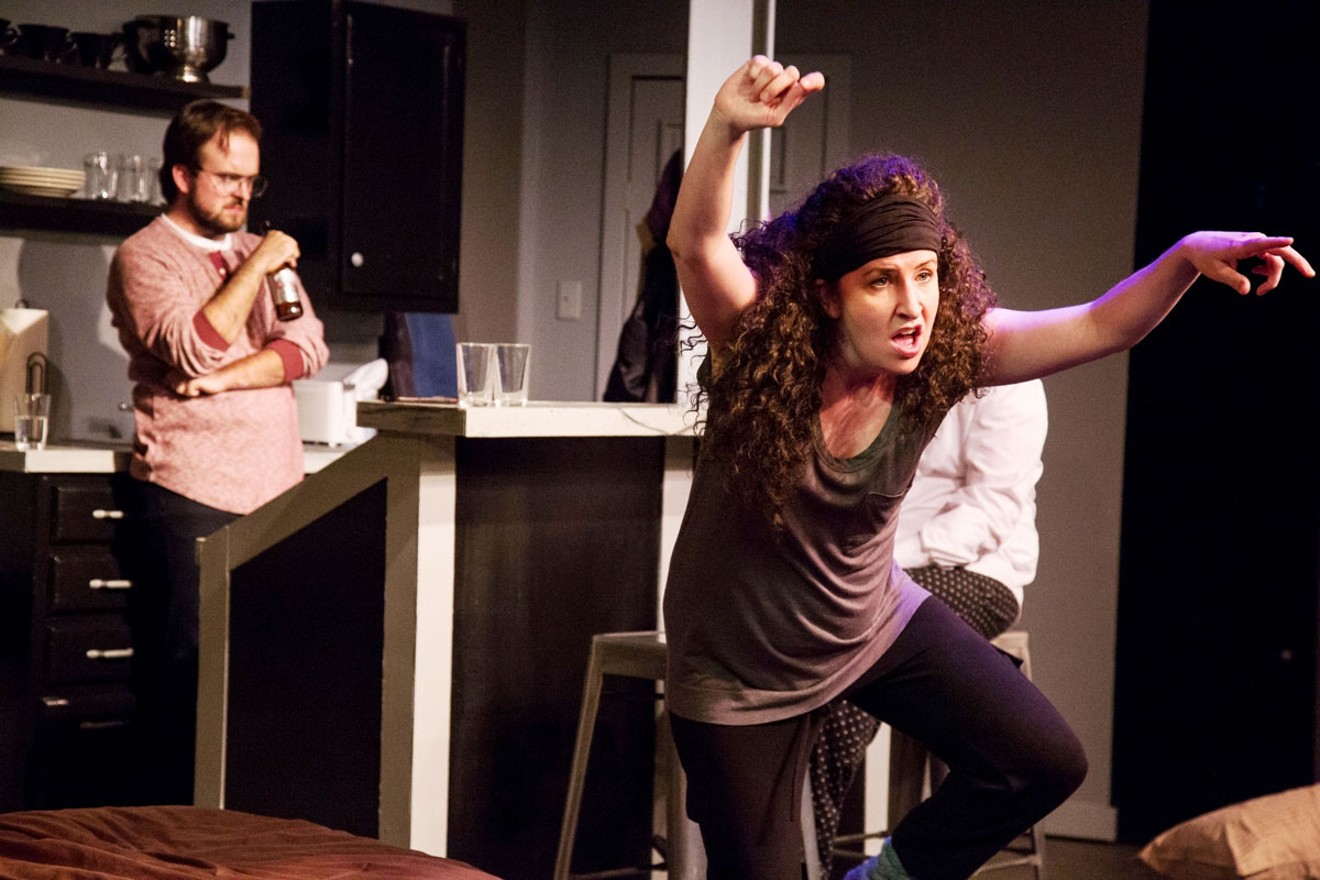The bad Jews in Joshua Harmon’s play of the same name, Bad Jews, are Diana — or as she prefers to be called, Daphna — and her cousin Liam. Daphna is one of those irritating, more-Jewish-than-thou people who uses her religion as a shield from loneliness and also to assert her superiority over others, loudly and vehemently. She plans to live in Israel, where she says she has a lover in the Israeli Defense Force, and when she gets there, she plans to join the army herself. And also to study the Torah. Liam is entirely secular and studying Japanese culture in graduate school. The cousins’ beloved grandfather, Poppy, has just died, and Liam missed both his death and the funeral because he was skiing in Aspen with his lovely, blond non-Jewish girlfriend, Melody, and was incommunicado, having accidentally dropped his cell phone from the chair lift. And then there’s a third grandchild, Liam’s brother, Jonah, who’s living in the upscale New York City apartment that their parents purchased for him. With the regional premiere of this fraught and funny ninety-minute play, perceptively directed by Josh Hartwell, the Edge Theater Company lives up to its name.
While Jonah does his best to stay out of the fray, Liam and Daphna fight like a pair of caged bobcats. The issue is possession of their grandfather’s “chai,” a piece of jewelry with the two Hebrew letters that mean “life.” While imprisoned in Auschwitz, Poppy had managed to hold onto the amulet throughout a terrible two-year ordeal by hiding it under his tongue. Daphna feels she deserves the chai because she’s the only family member carrying on the Jewish tradition; Liam wants to give it to Melody when he proposes, as their grandfather gave it to their grandmother when he proposed to her. (I must admit, the chai as a plot device puzzled me. I’m Jewish — some of my family members survived the war with concentration-camp numbers tattooed on their arms — but I had never heard of a chai before. Apparently, although the significance of the two letters has some history, the chai only came into use as an article of jewelry forty or fifty years ago.)
Both Daphna and Liam are loathsome, but their venomous exchanges are hilarious and insanely inventive, and they’re what give this swift, weirdly exhilarating play its force and energy. Besides, while the two are completely irrational and their mutual rage was clearly simmering for years before Poppy’s death and the battle for the chai, the issues and arguments they raise are ones that every Jew I know has given a lot of thought to. In Samuel G. Freedman’s deeply researched book, Jew Vs. Jew: The Struggle for the Soul of American Jewry, he describes the warm, socialistic Yiddishkeit of the early Eastern European immigrants, who concerned themselves more with social justice than religious practice, and how that collided, sometimes furiously, with the ideals of the far more rigidly religious Orthodox Jews who arrived after World War Two.
So periodically, despite the comic tone of the play, I found myself weighing Daphna and Liam’s arguments somewhat seriously, and occasionally my own response surprised me. As a secular Jew, I’d have expected to side with Liam more often than Daphna, but some of her comments cut deep, partly because of the incisive script, partly because Missy Moore plays the role with such an adept mixture of pure lunacy and intense feeling. In assimilating, in turning his back on his own people, “you’re killing something,” she tells Liam. “Culture matters. Who people are matters.” And when he extolls the concept of a world no longer separated by race or religion, she exclaims, “A world without Jews is progress?” Liam, played by a rage-filled and unbending John Wittbrodt, holds his own.
Besides, just as you begin to sympathize with Daphna, you have to deal with her incomprehensible rudeness toward Melody — or as she calls her, “the tepid little Bambi creature.” Chloe McLeod is charming in the role, and her carefully over-articulated rendition of “Summertime” from Porgy and Bess (a graduate in opera, she’s been bullied into singing by Daphna) provides a comic high point. Jason Green does well as evasive Jonah, and at the end of the play, we find out something startling about him — a revelation that reveals either a transcendent Jewish soul or a profound creepiness.
Bad Jews, presented by the Edge Theater Company through August 6, 1560 Teller Street, Lakewood, 303-232-0363, theedgetheater.com.
[
{
"name": "Air - MediumRectangle - Inline Content - Mobile Display Size",
"component": "12017618",
"insertPoint": "2",
"requiredCountToDisplay": "2"
},{
"name": "Editor Picks",
"component": "17242653",
"insertPoint": "4",
"requiredCountToDisplay": "1"
},{
"name": "Inline Links",
"component": "18838239",
"insertPoint": "8th",
"startingPoint": 8,
"requiredCountToDisplay": "7",
"maxInsertions": 25
},{
"name": "Air - MediumRectangle - Combo - Inline Content",
"component": "17261320",
"insertPoint": "8th",
"startingPoint": 8,
"requiredCountToDisplay": "7",
"maxInsertions": 25
},{
"name": "Inline Links",
"component": "18838239",
"insertPoint": "8th",
"startingPoint": 12,
"requiredCountToDisplay": "11",
"maxInsertions": 25
},{
"name": "Air - Leaderboard Tower - Combo - Inline Content",
"component": "17261321",
"insertPoint": "8th",
"startingPoint": 12,
"requiredCountToDisplay": "11",
"maxInsertions": 25
}
]












